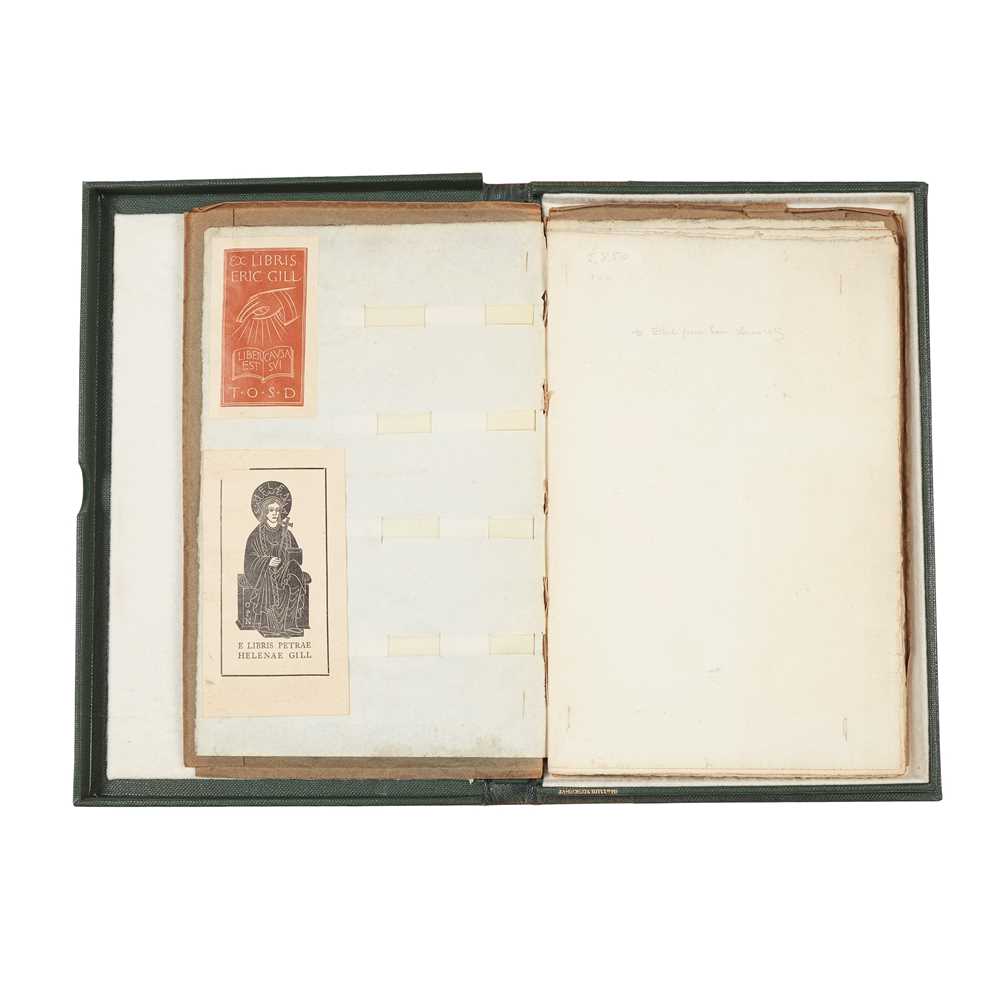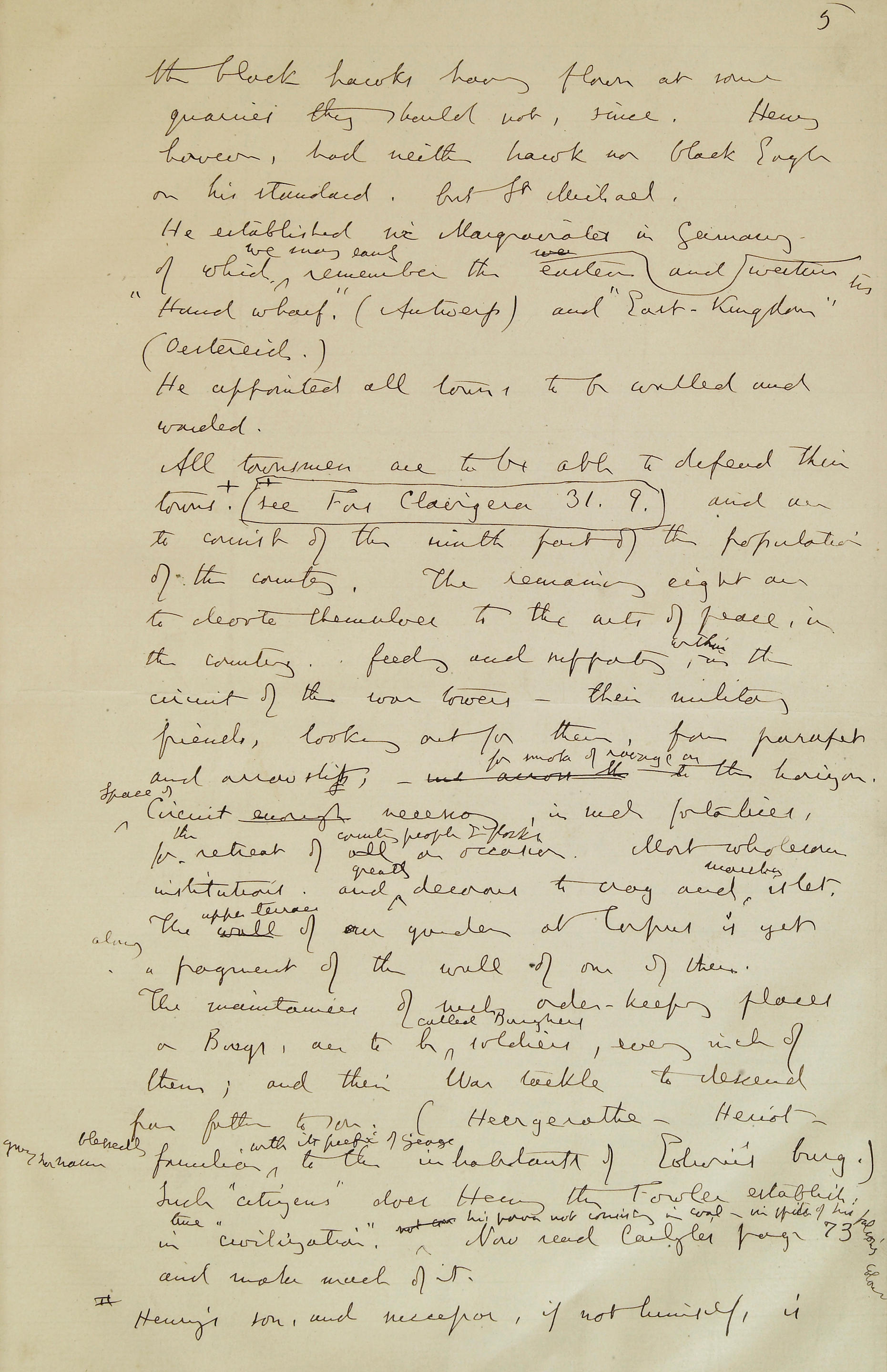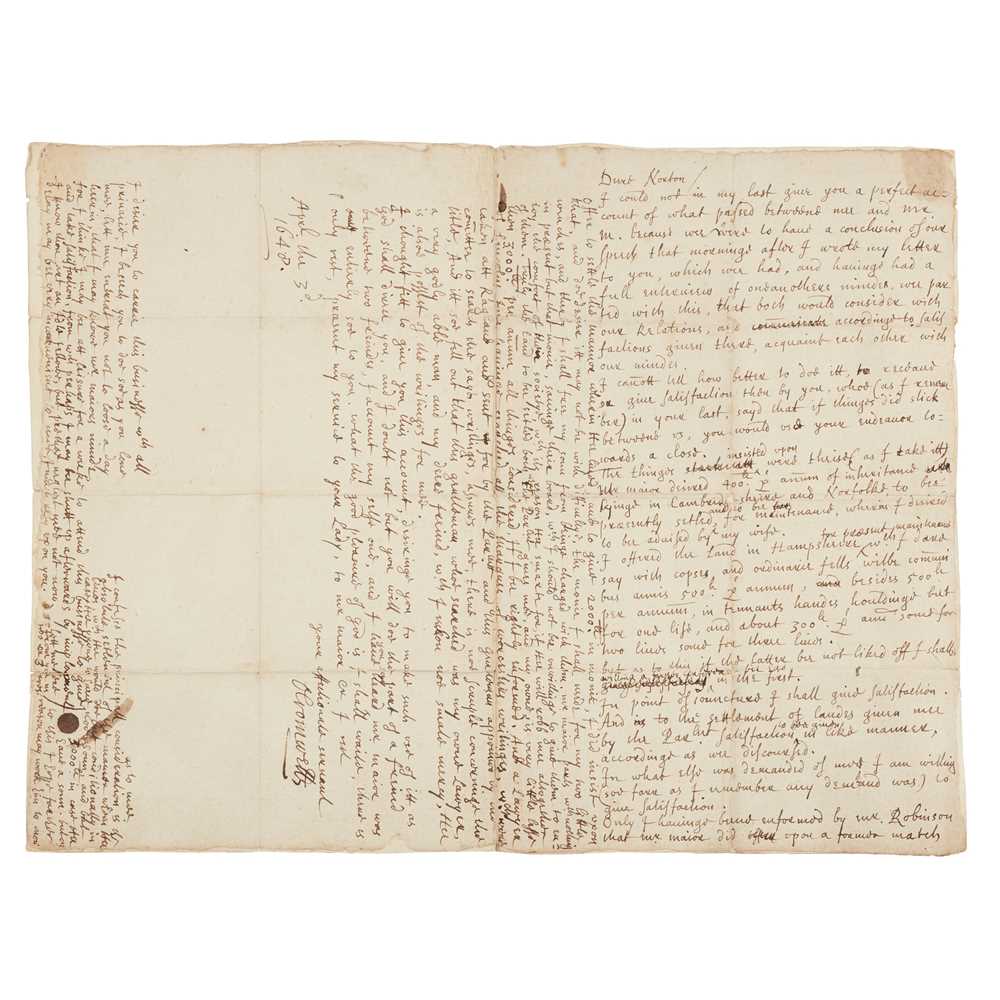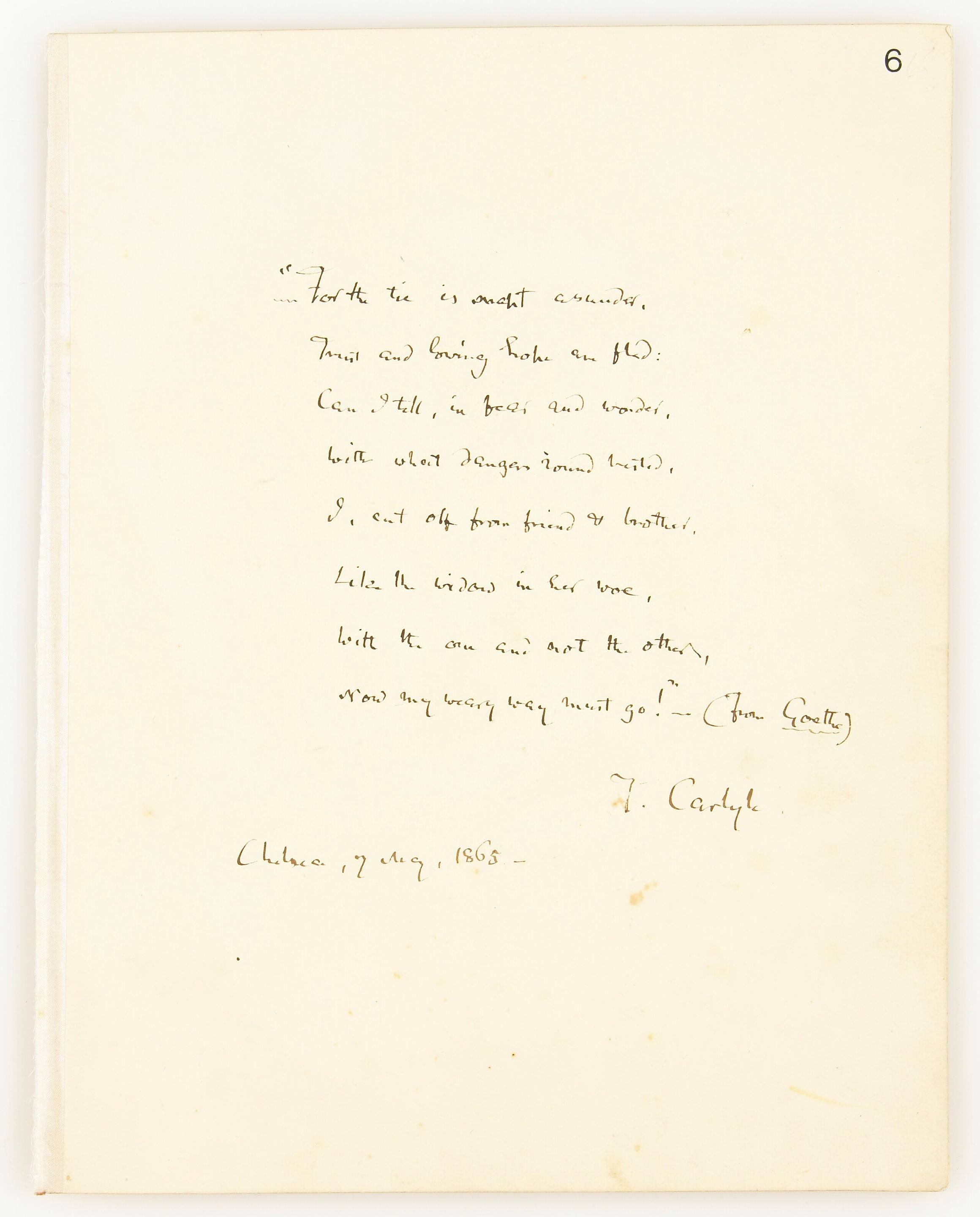Thomas Carlyle
A collection of autograph manuscript notes, drafts and fragments, in three groups:
i) Group of papers on Frederick the Great (“It was not a shining epoch in which Fk was born…”, 4 pages), the state of Europe in the early 18th century, the Electors of Hanover, the Guelph dynasty (“The Guelf Dynasty, now occupying better or worse the thrones of these realms, is not considered to be of romantic nature…”), Germanic names (1 page), the limits of history (“The domain of History is miserably limited. So vast a majority of Nations […] have no History at all…”), autobiographical reflections (“To stay a little this distracted deluge of paper-clippings…”), and a note on the industrial age; 17 pages on 12 leaves of paper
ii) Group of papers including "Collectanea Cromwelleana" (4 pages), "ghosts of Archbishops", "Kircher & [magic lantern] Slides", and others on Ecclesiastical history, the heroic, European political history, and Irish affairs, four pages of notes in the hand of Mary Aitken, and notes on the court of Louis XIV at Versailles (with annotations by Carlyle), altogether 39 pages on 24 leaves of paper (including paper watermarked 1834 and 1836)
iii) Autograph manuscript reading notes, aides memoire, book lists, and similar research note, written in ink and pencil on miscellaneous folded scraps of paper (including the versos of letters received), many endorsed by Carlyle in ink or pencil, c.34 items, in an envelope with a note in pencil stating these were found enclosed within a letter by R.W. Emerson
"...What British man, worthy of that name, can look upon the sordid agonies and dire bewilderments of Ireland and Scotland and England in this time without longing to help if with hand and head and heart he by possibility could? To help by speech is often not so necessary as to help by silence, - by the suppression of impatient, contradictory, or otherwise questionable speech..."
AN IMPORTANT GROUP OF WORKING PAPERS BY THOMAS CARLYLE. These manuscripts include notes, drafts, and fragments on a range of subjects, from the state of Ireland in the immediate aftermath of the Great Hunger, to an evocative description of the "stagnant land of mud and marsh" in which Oliver Cromwell was born, to an explanation of his focus on "great men": "Of many millions of men, it stands in the nature of the case that hardly one or two can have the least chance of an articulate biography". Many of the papers relate to Carlyle's last great work, Frederick the Great, which he composed between 1851 and 1865. Carlyle's notes on the age of Frederick the Great is a good example of his urgent style and unsparing vision. Far from providing a complacent narrative of the importance of the period, he emphasises that Frederick's age was "not one of those epochs which [...] claim their place to all time in the memory of mankind". He continues by contrasting the age's vision of itself and its own importance, to the way it is seen just a hundred years later:
"...To its own age the epoch was extremely admirable and important, seemed the consummate flower of so many foregoing epochs, and perhaps the grandest of all possible epochs: but in its essence and in fact, it was by no means so [...] The perennial human heart has little relation to it, the human memory refuses to take it in. How dim it is already grown to all mortals [...] In one century it is already beginning to be forgotten..."
The current assemblage of papers is the most substantial group of Carlyle manuscripts to have been offered at auction in many decades. On Carlyle's death these manuscripts passed to Mary Aitken Carlyle and her husband Alexander Carlyle, but they were not sold in the Sotheby's auction of Carlyle books and papers on 13-14 June 1932, which followed the death of Alexander Carlyle.
PROVENANCE:Thomas Carlyle; Alexander Carlyle (1843-1931) and Mary Carlyle Aitken (1848-95); thence by direct descent
Thomas Carlyle
A collection of autograph manuscript notes, drafts and fragments, in three groups:
i) Group of papers on Frederick the Great (“It was not a shining epoch in which Fk was born…”, 4 pages), the state of Europe in the early 18th century, the Electors of Hanover, the Guelph dynasty (“The Guelf Dynasty, now occupying better or worse the thrones of these realms, is not considered to be of romantic nature…”), Germanic names (1 page), the limits of history (“The domain of History is miserably limited. So vast a majority of Nations […] have no History at all…”), autobiographical reflections (“To stay a little this distracted deluge of paper-clippings…”), and a note on the industrial age; 17 pages on 12 leaves of paper
ii) Group of papers including "Collectanea Cromwelleana" (4 pages), "ghosts of Archbishops", "Kircher & [magic lantern] Slides", and others on Ecclesiastical history, the heroic, European political history, and Irish affairs, four pages of notes in the hand of Mary Aitken, and notes on the court of Louis XIV at Versailles (with annotations by Carlyle), altogether 39 pages on 24 leaves of paper (including paper watermarked 1834 and 1836)
iii) Autograph manuscript reading notes, aides memoire, book lists, and similar research note, written in ink and pencil on miscellaneous folded scraps of paper (including the versos of letters received), many endorsed by Carlyle in ink or pencil, c.34 items, in an envelope with a note in pencil stating these were found enclosed within a letter by R.W. Emerson
"...What British man, worthy of that name, can look upon the sordid agonies and dire bewilderments of Ireland and Scotland and England in this time without longing to help if with hand and head and heart he by possibility could? To help by speech is often not so necessary as to help by silence, - by the suppression of impatient, contradictory, or otherwise questionable speech..."
AN IMPORTANT GROUP OF WORKING PAPERS BY THOMAS CARLYLE. These manuscripts include notes, drafts, and fragments on a range of subjects, from the state of Ireland in the immediate aftermath of the Great Hunger, to an evocative description of the "stagnant land of mud and marsh" in which Oliver Cromwell was born, to an explanation of his focus on "great men": "Of many millions of men, it stands in the nature of the case that hardly one or two can have the least chance of an articulate biography". Many of the papers relate to Carlyle's last great work, Frederick the Great, which he composed between 1851 and 1865. Carlyle's notes on the age of Frederick the Great is a good example of his urgent style and unsparing vision. Far from providing a complacent narrative of the importance of the period, he emphasises that Frederick's age was "not one of those epochs which [...] claim their place to all time in the memory of mankind". He continues by contrasting the age's vision of itself and its own importance, to the way it is seen just a hundred years later:
"...To its own age the epoch was extremely admirable and important, seemed the consummate flower of so many foregoing epochs, and perhaps the grandest of all possible epochs: but in its essence and in fact, it was by no means so [...] The perennial human heart has little relation to it, the human memory refuses to take it in. How dim it is already grown to all mortals [...] In one century it is already beginning to be forgotten..."
The current assemblage of papers is the most substantial group of Carlyle manuscripts to have been offered at auction in many decades. On Carlyle's death these manuscripts passed to Mary Aitken Carlyle and her husband Alexander Carlyle, but they were not sold in the Sotheby's auction of Carlyle books and papers on 13-14 June 1932, which followed the death of Alexander Carlyle.
PROVENANCE:Thomas Carlyle; Alexander Carlyle (1843-1931) and Mary Carlyle Aitken (1848-95); thence by direct descent















Try LotSearch and its premium features for 7 days - without any costs!
Be notified automatically about new items in upcoming auctions.
Create an alert